- Home
- Views On News
- Oct 15, 2021 - India's Big PSU Selloff: Watch Out for these Top Stocks
India's Big PSU Selloff: Watch Out for these Top Stocks

PSU stocks have been in focus over the last few days.
Investors cheered the long-pending privatisation of Air India. Hopes are pinned on more such disinvestments soon.
With a widening fiscal deficit gnawing at the economy, the Government of India (GoI) had listed the disinvestment of several PSUs as part of its plan to plug the gap.
It had earlier announced an ambitious disinvestment/privatisation target of PSUs to the tune of Rs 2.1 tn for the financial year 2021. In the budget for the year 2022, the target was set at Rs 1.75 tn.
However, the entire program got stalled due to the pandemic last year as well as a major part of this year.
As the Covid-19 situation in the country improves and the economy gradually gathers pace, the government has reiterated its intent to conclude a host of transactions by March 2022.
Here are the top 5 PSU stocks that could benefit from this move.
#1 BPCL
Bharat Petroleum Corporation (BPCL) is the second-largest oil marketing and the third-largest oil refining company in India.
It possesses 14-15% of the country's total refining capacity. It also has a market share of 26% in the domestic petroleum market.
The company's position in the industry is underpinned by its marketing and distribution infrastructure. BPCL had 18,637 retail outlets as of March 2021.
It owns a 12.5% stake in Petronet LNG, along with 3 other PSUs - IOCL, ONGC, and GAIL and a 22.5% stake in the gas distribution company, Indraprastha Gas as part of a joint venture with GAIL India.
The government gave the nod for the company's privatisation in November 2019. It currently holds a 52.98% stake in the company.
The privatisation is expected to be completed by March 2022 and is expected to fetch the government over Rs 800 bn from the sale of its entire stake.
It has already received expressions of interest for the refiner from Vedanta and two global private equity funds.
For the financial year 2022, BPCL has planned a capital expenditure of Rs 100bn.
It will spend most of it on expanding the capacities of petrochemical plants. It will also make an investment in its subsidiaries - Bharat Petro Resources (BPRL) and Bharat Gas Resources (BGRL) to support the exploration and production, and expansion of its CGD network.
In its latest quarterly results, BPCL reported a 28% YoY fall in net profit at Rs 15 bn.
The company's sales in the reported quarter, however, surged 77% YoY to Rs 896 bn, which was sharply higher than estimates.
The strong sales performance by the company was due to the low base of the year-ago quarter when the national lockdown severely hit demand for retail fuel in the country.
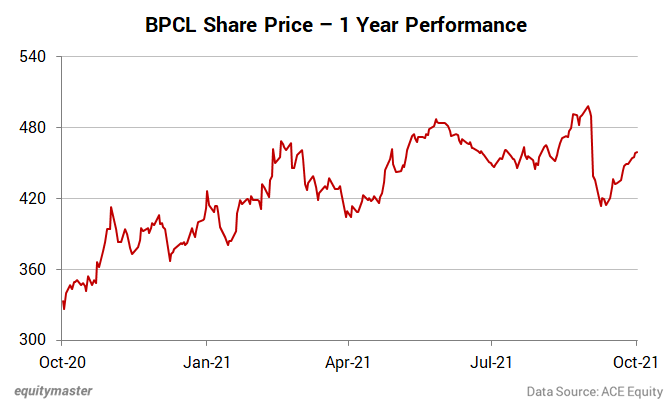
#2 Cochin Shipyard
Cochin Shipyard is the largest shipbuilding and maintenance facility in India. The company builds platform supply vessels and double-hulled oil tankers.
Even though it's registered as a commercial shipyard, it derives 80% of its revenues from building and repairing defence ships. It derives the remaining 20% from commercial shipbuilding and ship repair.
The Government of India owns 100% of Cochin Shipyard and plans to sell 63.75% of its stake or 296.9 m shares in the company along with the transfer of management control as part of its divestment plan.
The company is a unique player to ride the potential in India's defence manufacturing space. Its towering performance in a difficult sector lends it fundamental merit.
It is also one of the most profitable companies in the industry (including private shipyards) and is a consistent dividend payer. This makes the PSU one of the safest bets.
For the June 2021 quarter, the company reported a marginal decline in revenue as its operations were negatively impacted due to the second wave of the pandemic.
However, the company is gearing up to bring its top-line back to pre-pandemic levels by executing orders in all three of its major business categories.
The company's current order book size stands at Rs 120 bn, which includes private, government, and navy shipbuilding and ship repairs. Its orders are all in the execution phase.
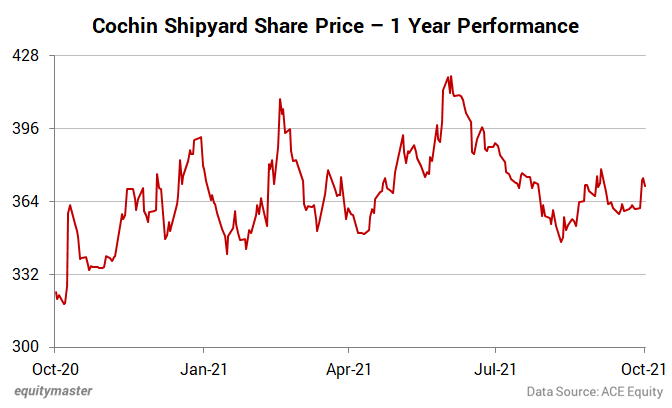
#3 Bharat Earth Movers
BEML, previously known as Bharat Earth Movers, is a PSU that plays a pivotal role in India's core sectors such as defence, rail, power, mining, and infrastructure.
The company manufactures a variety of heavy equipment, that are used for earthmoving, transport and mining.
It has an excellent track record of winning repeat orders from a reputed customer base mostly through a competitive bidding process and from its established service network.
Additionally, it has a strong order book which is expected to support its revenue growth over the medium term.
BEML was fully owned by the Government of India until 1992, after which the government divested 25% of its stake in the company.
It's now a public sector undertaking with the government holding a 54.03% stake. Of this, the Ministry of Defence has approved the strategic disinvestment of 26%.
It has already received multiple expressions of interest for the company.
The expectation of a pickup in capital expenditure and the government's focus on increasing infrastructure spending augurs well for BEML.
However, in its latest quarterly results, BEML reported a net loss of Rs 940 m. Net revenue also fell to Rs 4.7 bn compared to Rs 18.1 bn in the June 2020 quarter.
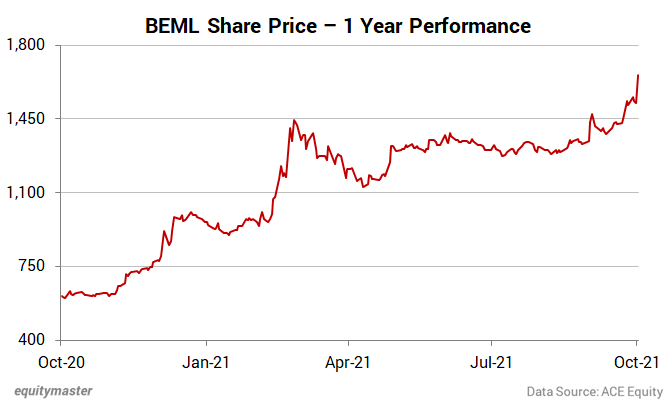
#4 Container Corporation of India
Container Corporation of India, popularly called Concor, is India's largest railway logistics company. It handles nearly 75% of the containers transported via railways.
Rail container transportation is a capital-intensive business and Concor has an enviable first-mover advantage in this segment. Until 2006, it was the sole operator in the industry.
Since 2006, other players have entered this industry but none of them have been able to replicate the network and infrastructure that Concor has.
The market share of Concor stands at 75%. Using its huge economies of scale, Concor enjoys distinct pricing power. A pan India network also makes it the lowest cost service provider.
The central government has given its nod to sell 30.8% out of its 54.8% holding in Concor and management control to strategic buyers.
However, the decision has raised concerns about handing over railway land acquired from farmers at a concessional rate or free of cost to a private party for commercial use in a "backdoor arrangement".
For the June 2021 quarter, Concor reported a 52.4% YoY increase in revenue on the back of an economic recovery and resurging global trade. As a result, the company's net profit soared 343.6% YoY. Net profit margins also increased by 9.3% YoY to 14.2%.
In its latest conference call, the company's management has said that the land license fees (LLF) charge for the financial year 2022 has been revised to Rs 3.8 bn compared to Rs 4.5-5 bn for the financial year 2021, based on the revised land rates by railways.
The operations for the DFC (Dedicated Freight Corridor) project have begun from the company's Khatuwas terminal. It plans to have 50 rakes (currently 12) of 25 tons axle by the end of the year.
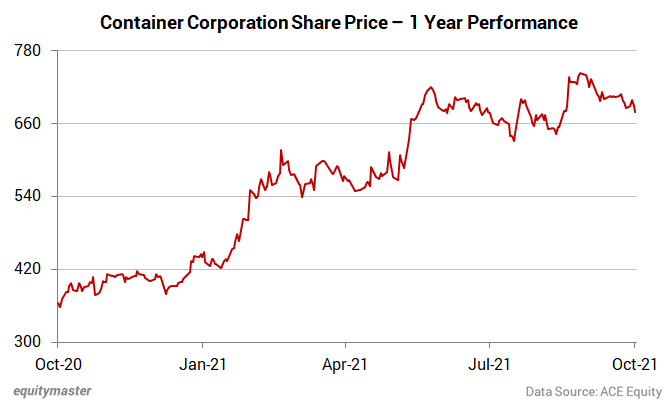
Performance over the years...
Speaking of PSUs, have a look at the chart below which shows the performance of BSE PSU index compared to BSE Sensex over the past few years.
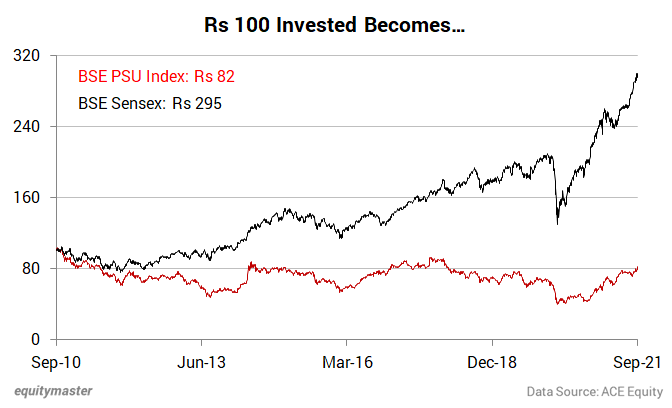
As can be seen from the chart above, over the last decade, Rs 100 invested in BSE PSU index would have eroded to Rs 80, compared to almost 3x gains for the Sensex.
Here's what Richa Agarwal, lead smallcap analyst at Equitymaster, wrote about PSU stocks in one of the editions of Profit Hunter...
- However, it will be folly to paint all PSUs with the same brush. There are some exceptions in this space, which put their private peers to shame.
In a recent editorial, I shared an opportunity in a PSU stock that is riding and enabling an irreversible megatrend - digitisation.
One of Richa's stock recommendation is a PSU stock. This smallcap PSU is leading the digitisation drive from the frontlines.
Richa believes it could be a perfect bet for these uncertain times. Hidden Treasure subscribers can read the recommendation here.
And if you're not a subscriber, here's where you can sign up.
To know what's moving the Indian stock markets today, check out the most recent share market updates here.
Disclaimer: This article is for information purposes only. It is not a stock recommendation and should not be treated as such. Learn more about our recommendation services here...


Equitymaster requests your view! Post a comment on "India's Big PSU Selloff: Watch Out for these Top Stocks". Click here!
Comments are moderated by Equitymaster, in accordance with the Terms of Use, and may not appear
on this article until they have been reviewed and deemed appropriate for posting.
In the meantime, you may want to share this article with your friends!